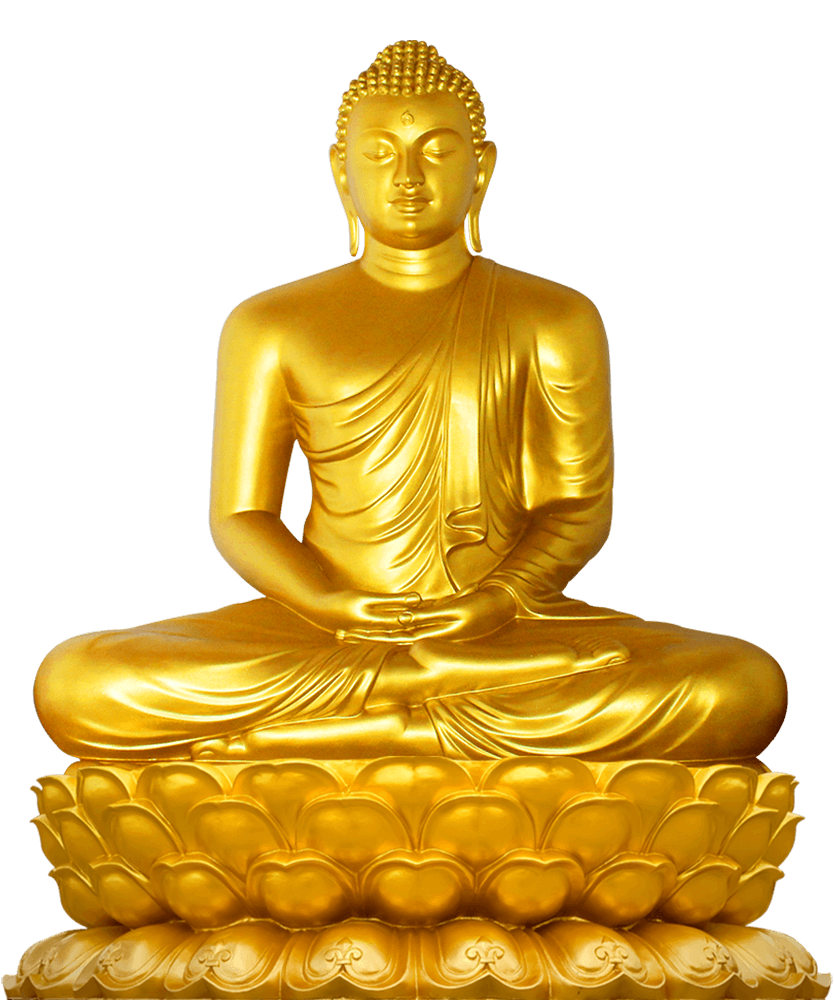|
The teaching founded by the Buddha is known, in English, as Buddhism. It may be asked, who is the Buddha? A Buddha has attained Bodhi and by Bodhi, it means wisdom, an ideal state of intellectual and ethical perfection which can be achieved by man through purely human means. The term Buddha means enlightened one, a knower. Buddhists believe that a Buddha is born in each aeon of time, and our Buddha the sage Gotama who attained enlightenment under the bo-tree at Buddha Gaya in India was the seventh in the succession.
Gotama was born the son of an Indian king on the border of modern Nepal 623 years before Christ. The wise men of the kingdom foresaw that he would become either an emperor or a Buddha, and his father, wanting him to be an emperor, kept him utterly secluded from all unpleasant things, so that he might not become wise by seeing life. But the gods knew that Gotama must become the Buddha, and so they visited Earth in various forms to let him see them. On three successive days, while on his way to the royal park, Gotama saw an old man, a sick man, and a corpse, and thus he learned that men all men must suffer and die. On the fourth day, he saw a monk; from this, he understood that to learn the way of overcoming man's universal sorrow he must give up worldly pleasures. Accordingly, in his twenty-ninth year, he renounced his kingdom and became an ascetic.
Gotama wandered about the countryside, a seeker after truth and peace. He approached many a distinguished teacher of his day, but none could give him what he sought. He strenuously practised all the severe austerities of monkish life, hoping to attain Nirvana. Eventually, his delicate body was reduced almost to a skeleton. But the more he tormented his body the further away he was from his goal. Realizing the futility of self-mortification, he finally decided to follow a different course, avoiding the extremes of pain and indulgence. The new path which he discovered was the Middle Way, the Eightfold Path, which subsequently became part of his teaching. By following this path his wisdom grew into its fullest power, and he became the Buddha. As a man Prince Gotama, by his own will, love, and wisdom, attained Buddhahood the highest possible state of perfection and he taught his followers to believe that they might do the same. Any man, within himself, possesses the power to make himself good, wise, and happy.
All the teachings of the Buddha can be summed up in one word: Dhamma. It means truth, that which is. It also means law, the law which exists in a man's own heart and mind. It is the principle of righteousness. Therefore the Buddha appeals to man to be noble, pure, and charitable not to please any Supreme Deity, but to be true to the highest in himself. Dhamma, this law of righteousness, exists not only in a man's heart and mind, it exists in the universe. All the universe is an embodiment and revelation of Dhamma. When the moon rises and sets, the rains come, the crops grow, and the seasons change, it, is because of Dhamma, for Dhamma is the law of the universe which makes matter act in the ways revealed by our studies of natural science.
If a man lives by Dhamma, he will escape misery and come to Nirvana, the final release from all suffering. It is not by any kind of prayer, nor by any ceremonies, nor by any appeal to a God, that a man will discover the Dhamma which will lead him to his goal. He will discover it in only one way by developing his character. This development comes only through control of the mind and purification of emotions. Until a man stills the storm in his heart, until he extends his loving-kindness to all beings, he will not be able to take even the first step toward his goal. Thus Buddhism is not a religion at all, in the sense in which the word is commonly understood. It is not a system of faith or worship. In Buddhism, there is no such thing as belief in a body of dogma which must be taken on faith, such as belief in a Supreme Being, a creator of the universe, the reality of an immortal soul, a personal saviour, or archangels who are supposed to carry out the will of the Supreme Deity. Buddhism begins as a search for truth. The Buddha taught that we should believe only that which is true in the light of our own experience, that which conforms to reason and is conducive to the highest good and welfare of all beings. Men must rely on themselves. Even though he may “take refuge in Buddha,” the expression used when a man pledges himself to live a righteous life, he must not fall victim to blind faith that the Buddha can save him. The Buddha can point out the path, but he cannot walk it for us.
|










